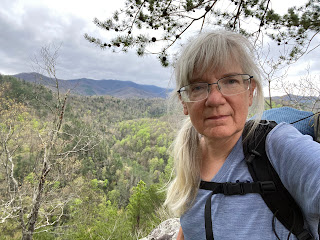There is nothing more frustrating than experiencing an
injury that keeps you from doing what you love to do. Especially hiking. After completing a three-week journey on the
Allegheny Trail, I came home, did too much, and ended up with severe hip pain and sciatica. Diagnosis - hip separation and muscle overuse (possible
piriformis syndrome). Right now I have a tendinitis issue from compensation due to a fracture in my toe after stubbing it on a rock. My third AT completion attempt is now on hold.
So now I am sidelined. I am no longer a happy hiker, enjoying what the trail has to offer, but resigned to icing, Physical Therapy, and simple walks. I’ve had injuries that have given me issues for many
years. It’s not an easy thing to deal with when you are active.
So what do you do when injury strikes?
1. First off, if you’ve suffered an injury, don’t be
brave and keep hiking on it. You’ll just do more damage. Pain and swelling is your
body's way of trying to tell you to STOP. So stop hiking. Period. (I only got off trail when the humidity and foot pain became too much. Later, I found out I had hiked over 70 miles on a broken big toe!).
2.
RICE. Rest, ice, elevation, compression. DO it immediately after an injury happens. Don’t
wait 24 hrs. It impedes the healing process. And be sure its ICE. Don’t ever
put heat on an injury. If your stomach can handle it, taking ibuprofen (Advil) helps
ease the inflammation. If you can’t, Tylenol helps with pain.
Turmeric is also an anti-inflammatory.
3. See the doctor. Many times, you can try to deal
with the injury at home. But in my case, I did not wait as things were not improving. Sometimes it's good not to wait, to ward off other issues (like scar tissue forming). In severe
cases with major swelling, pain, etc., you need a doctor to evaluate it. You may need
x-rays to make sure something isn’t broken (I could walk with my injured toe, but only an X-ray showed I had indeed fractured it). You may need physical therapy to
get back in the groove as soon as the injury allows. With the cost of medical care,
sometimes this is put off. Only you know how bad it is.
4.
Eat nutritious food. If you are going to be
sidelined for a while, be sure the food you eat is good for you. Don’t eat sugar
and useless carbs thinking it will make you feel better. It won’t and may even
worsen things. Protein, fiber-based foods, and lots of water are important to
the healing process and for your well-being.
.
5. Try not to get depressed. Easier said than done,
especially when you see your buddies hiking and you’re sitting. But most have suffered
like you have in one form or another. Most have been sidelined. Think of this
as rest time to do other things that maybe you haven’t done. Think of the projects
you can accomplish while you’re mending. Be sure to be outside too as sunshine
is important to elevating your mood. Talk to others who have had injuries. Above
all, give yourself time to heal by giving your body (and you) a break.
6.
Engage in other physical activities that don’t
aggravate the injury. I have an exercise bike. Yeah, I hate the thing. But it’s
better than nothing for cardiovascular means. A swimming pool works wonders
also. Do some strengthening exercises (check online for exercises that have to
do with your injury to begin rehabilitating it when the pain allows). Stay involved.
When you are able, return slowly to your activity. Don’t push it or you could find yourself back at square one.
7.
Above all, be patient. It takes time to heal
ligaments, tendons, and bones. Let your body do its job. Then you will be
raring to go and ready to tackle that trail in no time. Remember, the trail is going
nowhere. You will be back when the time is perfect.
Related Blogs























.jpg)






